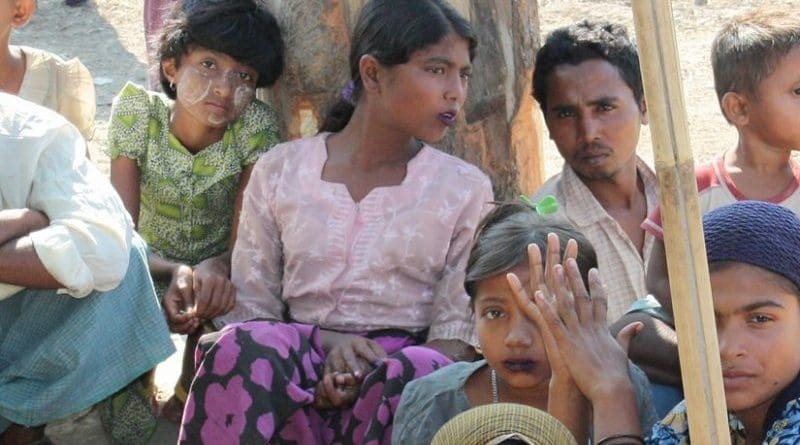Myanmar: Government Rohingya Report Falls Short, Says HRW
Myanmar’s investigation of its 2017 “clearance operations” contains selective admissions of military wrongdoing but does not begin to address the massive violations by government security forces against Rohingya Muslims, Human Rights Watch said today. Myanmar’s donors and concerned governments should be clear that the Independent Commission of Enquiry’s report falls well short of creating the conditions for justice and accountability or the safe return of Rohingya refugees from Bangladesh.
The 15-page executive summary released by the Office of the President on January 21, 2020 acknowledged that members of Myanmar’s security forces committed war crimes and serious human rights violations against “Muslims” in northern Rakhine State. Yet it found “no evidence of gang rape committed by Myanmar’s security forces,” despite extensive documentation of widespread rape against Rohingya women and girls by the United Nations Independent International Fact-Finding Mission on Myanmar and human rights groups, including Human Rights Watch. The summary found no evidence of genocidal intent and did not address alleged crimes against humanity. The government has yet to release the full report.
“The Myanmar commission’s report departs from longstanding government efforts to absolve the military of wrongdoing, but it’s still a major disappointment,” said Brad Adams, Asia director at Human Rights Watch. “Contrary to the UN’s findings, the report refuses to acknowledge the scale of atrocities against the Rohingya, shockingly denies the military’s widespread use of sexual violence, and fails to hold senior military officials responsible. The report isn’t a credible basis for justice and accountability for mass crimes.”
The commission’s summary reflects a nontransparent investigation by a politically skewed commission working closely with the Myanmar government, Human Rights Watch said.
The commission acknowledged that “some members of Myanmar’s Defense Services and the Police Force intentionally killed or displaced civilians, mostly Muslims, during the internal armed conflict in northern Rakhine State in 2017.” It also found that “possible war crimes” and “serious human rights violations may have occurred in the form of disproportionate use of force by some members of Myanmar’s Defense Services and Police Force in the course of internal armed conflict” against the Arakan Rohingya Salvation Army (ARSA). The commission also found that “mass killings” of civilians by security forces occurred in Tula Toli (also called Min Gyi), Chut Pyin, Maung Nu, and Gu Dar Pyin villages in Maungdaw Township, but suggests – contrary to findings by the UN and rights groups – that most of the killings occurred during armed clashes between the military and ARSA.
The commission said it found no evidence suggesting killings or acts of displacement were committed with “an intent or plan to destroy the Muslim or any other community in northern Rakhine State,” thus seeking to repudiate genocide allegations. It failed to address allegations of crimes against humanity, which entail a widespread or systematic attack on a civilian population.
Myanmar authorities need to allow independent international investigations into the role of the military chain of command if they want to address global skepticism about the government’s response to the atrocities, Human Rights Watch said.
“The commission appears to admit just enough to try to placate international opinion, which has overwhelmingly concluded that crimes against humanity and even genocide occurred, while shielding senior military commanders who planned and ordered atrocities,” Adams said. “Scapegoating a few low-ranking soldiers will fool no one. The commission’s report is only meaningful if the military acknowledges responsibility and agrees to an independent international justice process.”
The Independent Commission of Enquiry (ICOE), established in August 2018, deployed two Evidence Collection and Verification Teams in Yangon and Naypyidaw, Myanmar’s capital, but did not interview refugees in Bangladesh, where Rohingya could speak more freely and with less fear of retaliation. The composition, mandate, and previous statements from commission members, which include a member from the Philippines and one from Japan, have long raised serious questions about its impartiality and independence. At the outset, the commission’s chair publicly said there would be “no blaming of anybody, no finger-pointing of anybody … saying you’re accountable.”
The summary indicates “more than a dozen” case files were passed to Myanmar’s Attorney General’s office and the Office of the Judge Advocate General for further investigation. But unless the government fully and fairly investigates and prosecutes all those responsible for the mass crimes against the Rohingya, including at the highest ranks, the commission will be remembered only for attempting to limit damage to Myanmar’s reputation and not for uncovering the truth and advancing accountability, Human Rights Watch said.
The commission is the eighth government-appointed body set up ostensibly to investigate abuses against the Rohingya. The previous bodies failed to conduct credible and impartial inquiries, leading the government to set up the latest commission in an apparent effort to stave off efforts to refer the situation to the International Criminal Court or set up an ad hoc international tribunal.
“Concerned governments have shown great patience to see if this commission would finally lead to a major breakthrough by the Myanmar authorities in truth-telling and accountability,” Adams said. “While low expectations may cause some to see a glass half full, the sad reality is a glass that’s still nearly empty. The government’s modest admissions of responsibly are just too little, too late.”

